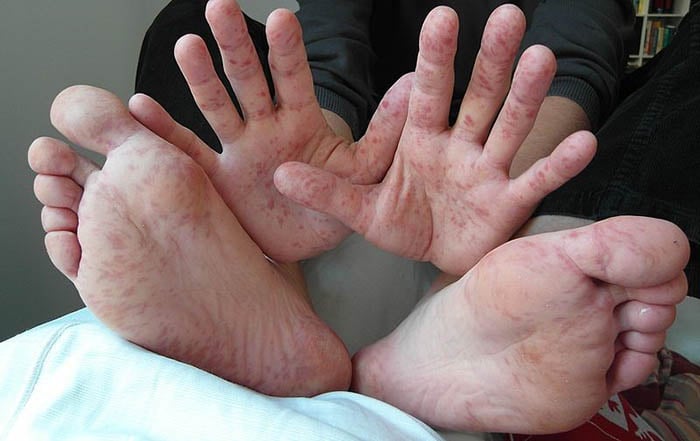
By Connie Colbert
GCU Director of Health Services
What types of summer illness should you be looking out for?
One of them is hand, foot and mouth disease, otherwise known as Coxsackie virus. It is contagious and can spread like wildfire through day cares or families.

It is a common illness that causes sores in or on the mouth, on hands and feet, and sometimes on buttocks and legs. The sores may be painful and make the skin itchy. The illness usually doesn't last more than a week.
It is common in children but also can occur in adults. It can occur at any time of year but is most common in the summer and fall.
What are the symptoms?
Many symptoms are related to hand, foot and mouth disease:
- A red rash on the palms, without itching but sometimes with blistering soles and sometimes the buttocks
- Feeling of being unwell (malaise)
- Irritability in infants and toddlers
- Fever
- Poor appetite
- Sore throat
- Headache
At first you may feel tired, get a sore throat or have a fever of around 101-103 degrees. After a day or two, sores or blisters may appear. In some cases, a skin rash may appear before the blisters. The blisters may break open and crust over. The sores and blisters usually go away in a week or so.
In some cases, people have no symptoms, or symptoms are very mild.
What causes it?
It is caused by a viral infection, most commonly by enterovirus or Coxsackievirus. The virus can be spread through contact with an infected individual’s nose and throat secretions (such as saliva, sputum or nasal mucus), blister fluid and feces (stool). The fluid in the blisters may contain the virus.
Often the disease breaks out within a community.
Symptoms usually appear 3-6 days after being exposed to the virus. This is called the incubation period.
How is it diagnosed?
A health care provider can tell by the symptoms you describe and by looking at the sores and blisters. Tests usually aren't needed.
How is it transmitted?
The virus may be spread to another person through:
- Close personal contact
- The air through coughing or sneezing
- Contact with feces
- Contact with contaminated objects and surfaces
How can spread be prevented?
Hand, foot and mouth disease is highly contagious. If you have this disease, limit exposure to others while you have active signs and symptoms, especially fever.
There is no vaccine to protect against the virus that causes it.
To reduce risk of infection:
- Wash hands often with soap and water, especially after using the toilet
- Clean and disinfect frequently touched surfaces and soiled items
- Avoid close contact such as kissing, hugging or sharing eating utensils or cups/water bottles
How is it treated?
There are no specific treatment methods for hand, foot and mouth disease. The disease runs its course, and the symptoms tend to disappear on their own within seven to 10 days.
- You may use a topical oral anesthetic to alleviate the pain caused by the mouth sores. You also can take over-the-counter medications such as ibuprofen to reduce the discomfort.
- It is essential to note that children should avoid the intake of aspirin.
- There is a home remedy to try to ease the discomfort called “magic mouthwash.”
- Mix liquid Benadryl and liquid Maalox in equal parts and dab on sores in the mouth. Make sure the dose is appropriate for the age of the child, if applicable.
Some types of beverages and food items tend to irritate the sores in the mouth and make for difficult ingestion of food. Below are some tips to relieve the general discomfort and make the blisters less irritable so that food consumption is easier:
- Suck on ice chips or ice pops
- Consume cold beverages such as ice water and cold milk
- Drink sherbet or eat ice cream
- Acidic beverages and foods such as fruit drinks, soda and citrus fruit should be avoided
- Consume soft foods that do not require a lot of chewing
- Salty and spicy foods should be avoided
- Rinse the mouth with warm water after consuming food
- Rinse your mouth with warm water mixed with salt several times a day to alleviate the inflammation and pain
- If you have mouth sores, it might be painful to swallow. However, it is important to drink enough liquids to prevent dehydration (loss of body fluids). If you cannot swallow enough liquids, you may need to receive them intravenously (IV).















